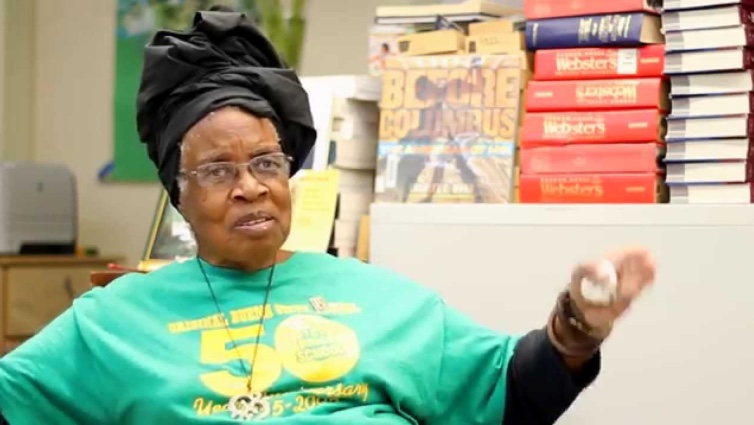 Tchaiko Kwayana made her transition on May 6, 2017 in San Diego. In the eyes of many of us at her Celebration of Life, she has moved from being a fierce fighter for Justice and role model to an “ancestor with a great legacy,” and as such will continue to inspire us.
Tchaiko Kwayana made her transition on May 6, 2017 in San Diego. In the eyes of many of us at her Celebration of Life, she has moved from being a fierce fighter for Justice and role model to an “ancestor with a great legacy,” and as such will continue to inspire us.
I met Tchaiko and Eusi Kwayana about ten years ago. Eusi is a Guyanese hero. He heard about the Jonestown survivors from Peoples Temple who gathered for reunuions during the summer in San Diego, and somehow found a path to our family. Just as he continues to be a thoughtful, curious, and inspiring scholar in Caribbean politics well beyond his native country, Tchaiko was right there as well.
After our first few meetings, I began having a wonderful relationship with Tchaiko, mostly in emails and Facebook messages. Like me, she was a teacher, and she became my mentor. She would encourage me to widen my approach in presenting history to my own students. I was delighted to introduce her to my son Raul, another teacher in my family.
As her other friends mentioned at her ceremony, she had a predictable greeting, to everyone, in every setting: “Hello, much love to you. What are you reading? I want you to reflect on it.” Then she’d give an assignment. Either read further on the topic, or read on a different topic, or write about your insights, or something. She was an activist reader who wanted you to read, but more than that, to act upon what you read. Reading was not a passive hobby for her.
Tchaiko had many outstanding experiences and journeys. She began attending school when she was 2 or 3, and graduated from college at 16. She has taught every level of education from elementary, high school and college. She earned her National Board Certification in Teaching in the 1990s, and helped facilitate a Project on the History of Black Writing with the Langston Hughes National Poetry Circle in 2004.
For the final decade of her life, she was an adjunct professor at San Diego Mesa College, where she taught both U.S. History and Honors English from an African American perspective. She also worked with the Malcolm X Library in San Diego and the Black Storytellers of San Diego.
At the time of her death, she was completing her doctoral degree in History, with a specialization in African Antiquities. She taught that “history and humanity are linked,” and carried that into all of her work.
I have been reminded of the African proverb that captures Tchaiko completely: “Every time we lose an Elder, we lose a Library.” She was a vast library in the most modern definition, with the depth, richness, and understanding of the joys and tragedies of the past, and the understanding of the now. As the activist she was, she shared her new knowledge to make us all accountable.
Described as “relentless” and “fierce,” as living with “intention and purpose,” Tchaiko was the personification of Frederick Douglas’ advice that you must be forever vigilant. She made us all work, and she made us all better.
(Laura Johnston Kohl, who had lived in Jonestown but was working in Georgetown on 18 November, died on 19 November 2019 after a long battle with cancer. She was 72. Her writings for this website appear here.)